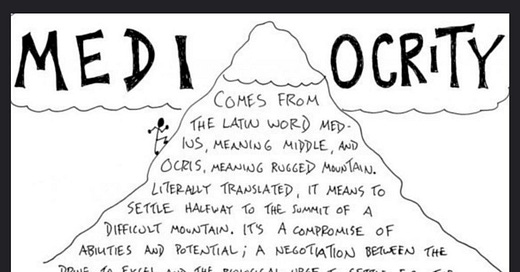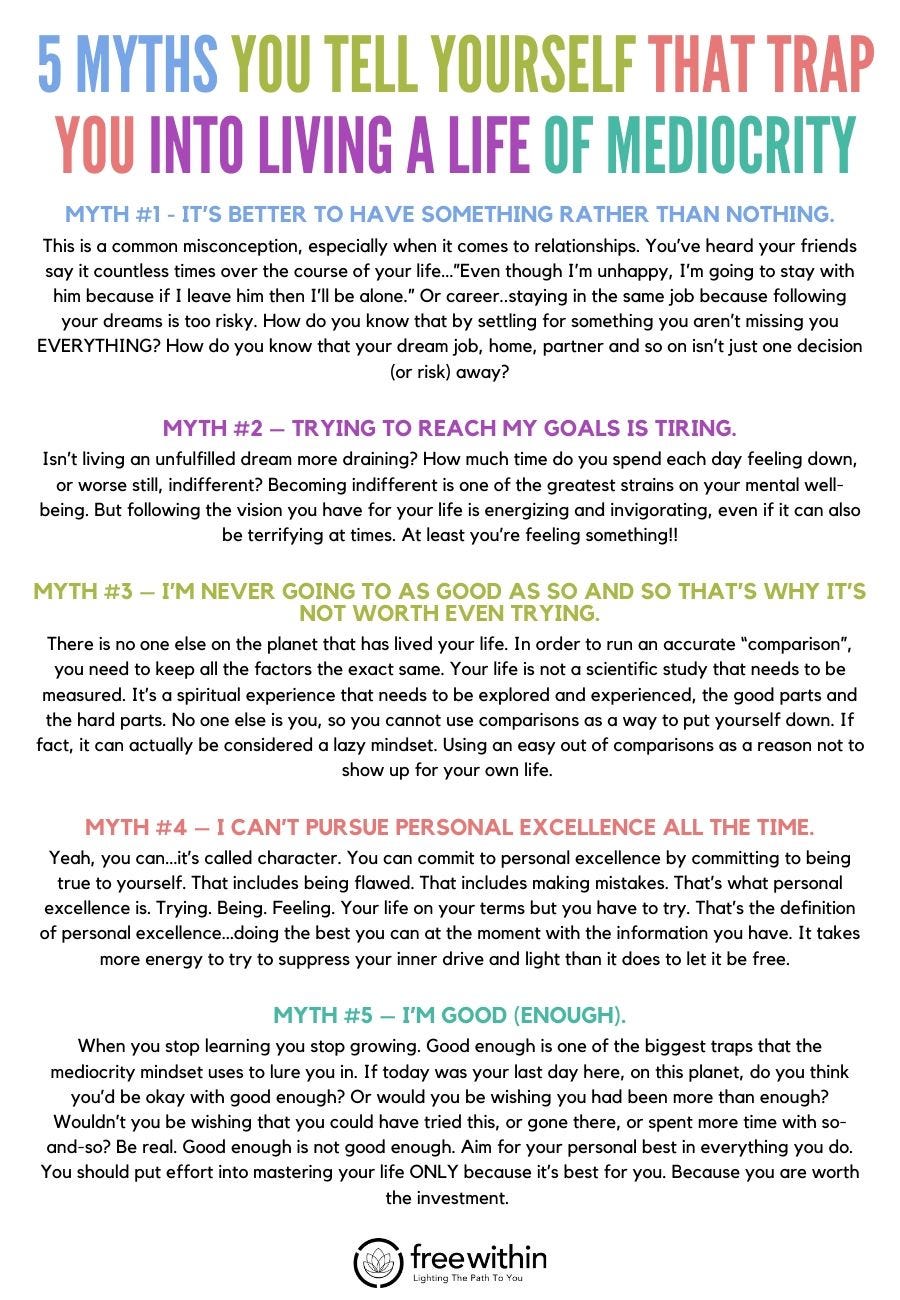“Mid" has evolved beyond teenage slang. It's become a catch-all descriptor for anything that hovers around the uninspiring average, the blandly acceptable, the lukewarm. It labels things that are neither spectacular nor dreadful—just passable, just enough. "Mid" encapsulates a world of mild disappointments and muted satisfaction. It's the perfect word for our times, and it reflects a broader societal issue that demands our attention: the pervasive curse of mediocrity. It’s worth noting this week as our educational system ‘graduates’ every student on to the next grade despite any ‘Mid’ concerns that maybe the only direction Mid’s short sharp shock of value has not been pointed is at the teenagers themselves.
Admiral Hyman G. Rickover, the father of the nuclear Navy, famously said, "Mediocrity is the enemy." This sentiment resonated deeply with President Jimmy Carter, who recounted an interaction with Rickover in his biography, "His Very Best" In this story, Carter reflects on Rickover's relentless pursuit of excellence and the profound question he posed: “Did You Do Your Best?” This question cuts to the heart of the fight against mediocrity, urging us to push beyond the comfortable confines of the average and strive for true greatness.
As the story goes, in 1952 Jimmy Carter applied for the prestigious nuclear submarine program under the demanding Admiral Hyman Rickover. During his interview with the Admiral, Carter was told to discuss any topics he wished to talk about.
Fortunately, the future Nobel Peace Prize winner was well-versed in the areas of current events, seamanship, music, literature, naval tactics, electronics, and gunnery, and thus chose those subjects. But as Rickover grilled the former president on questions about each of these topics, Carter soon realized how very little he actually knew. He started to sweat under the collar as he felt less and less qualified and more and more inept with each question that was posed.
Finally, Carter was asked the question he had waited for, which he felt would redeem himself:
“How did you stand in your class at the Naval Academy?”
“Sir, I stood fifty-ninth in a class of 820,” Carter replied with a sense of pride.
As Carter waited for a congratulations that never came, he was asked another question:
“Did you do your best?”
Although tempted to say yes, Carter mulled over the question and recalled times he could have learned more about allies, enemies, strategies and weapons. He finally replied, “No sir, I didn’t always do my best.”
Admiral Rickover then turned around his chair to promptly end the interview. On his way out, he asked one final question of Carter:
“Why not?”
Mediocrity is insidious. It creeps into our lives through the normalization of the just-okay, the barely-satisfactory. It's found in the tepid consumer acceptance achieved through relentless market research. Take Starbucks, for instance. Everything about it is "mid." The coffee, the pastries, the ambiance—they're all designed to be inoffensive, broadly palatable, and utterly unremarkable. The same can be said for most airport experiences, where efficiency trumps any semblance of joy or delight. Even the corner bakery, which once offered a mix of excellent and subpar items, has often been replaced by yet another Tim Hortons, a chain that epitomizes the predictably adequate.
It’s worth quoting Rickover at length as there have seldom been more plain-spoken words to live by.
One must guard against banality, ineptitude, incompetence, mediocrity.
We as people seem inclined to accept average or mediocre performance.
Mediocrity can destroy us just as surely as perils far more famous. It is important
that we remember to distinguish between what it means to fail at a task and what
it means to be mediocre. There is all the difference in the world between the life
lived with dignity and style which ends up failing, and one which achieves power
and glory yet is dull, unoriginal, unreflective, and mediocre. In a real sense, what
matters is not so much whether we make a lot of money, hold a prestigious job,
or whether we don't; what matters is that we become people who seek out others
with knowledge and enthusiasm - that we become people who can enjoy our own
company. In the end, learning to avoid mediocrity gives us all a chance to
discover that success really comes in making ourselves into educated
individuals, able to recognize that there is always a difference between living with
excellence and living with mediocrity. Sherlock Holmes once told Watson,
"Watson, mediocrity knows nothing higher than itself. It takes talent to recognize
genius." To which he could have added it takes talent to know what counts is
condemning mediocrity not in others but in ourselves.
It is a device of the devil to let sloth into the world. One cannot work at his
profession alone without stagnating: some time away from the job can be as
much or more important in man's overall development. Intellectually, we must
never stop growing. Our conscience should never release us from concern for
the problems of the day. Our minds must be forever skeptical yet questioning.
We must strive to be singularly free from that failing so common to man, deplored
by Pascal in the "Pense'es," of filling our leisure with meaningless distractions so
as to preclude the necessity of thought.
The tragedy of "mid" is that it robs us of the peaks and valleys that make life vibrant and memorable. When everything is designed to be average, we lose the thrill of the exceptional and the lessons of failure. We become complacent, settling for the safety of the middle ground rather than reaching for the stars.
Rickover's admonition to fight mediocrity is a call to action in our personal and professional lives.
It's a reminder that our capacity for effort and excellence is far greater than we often realize. The battle against mediocrity starts with rejecting the "mid" in our own endeavors. It means pushing ourselves to do our best, to embrace the challenges and discomforts that come with striving for greatness.
In a world that increasingly values the bland and the broadly acceptable, we must champion the extraordinary. We must celebrate the innovators, the artists, the dreamers who refuse to settle for "mid." We must demand more from our institutions, our products, and ourselves. Only by doing so can we overcome the enemy of mediocrity and build a world that inspires, excites, and truly fulfills us.






